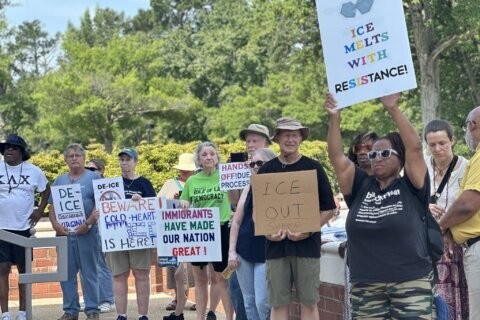WASHINGTON — Virginia Tech President Emeritus Charles William Steger Jr., who brought the campus through the 2007 mass shooting tragedy, died Sunday evening at his home in Blacksburg, Virginia. He was 70.
Steger served as the university’s 15th president from 2000 to 2014.
He was the school’s leader through the mass shooting in 2007, when 32 students were killed and 17 injured in two separate attacks by a senior at the school.
“Charles was an incredibly strong leader, a quiet leader and a very compassionate leader,” university spokesman Mark Owczarski said. “Look no further than the very darkest days of Virginia Tech on April 16th and how his strength and resolve and resilience held our community together in our very darkest hour.”
Owczarski said Steger’s guidance at that pivotal time helped the university not only to grow, but also to continue to thrive “even in spite of some of the most tragic circumstances.”
Steger championed and supported key research, Owczarski said. “To autonomous vehicles, to automotive safety, to so many different things — Charles created a foundation for that kind of enterprise and research to happen as Virginia Tech grew.”
Steger received three degrees from the school and spent nearly all of his 40-year professional career at the university.
“Charles Steger was a true visionary, a strong and resilient leader, and a deeply compassionate person who completely dedicated himself to our university,” said Virginia Tech President Tim Sands in a statement by the school. “He achieved incredible success because he, without question, personified our motto, Ut Prosim (That I May Serve). Virginia Tech is the great institution it is today because of him.”
During Steger’s tenure, Virginia Tech grew in enrollment from 28,000 to 31,000, increased graduate enrollment by 12 percent, raised more than $1 billion in private funding, formed a school of biomedical engineering, created a public-private school of medicine, joined the Atlantic Coast Conference (ACC), and constructed the Moss Arts Center and the Virginia Tech Research Center – Arlington as part of the largest building boom in university history.
“One of the things that he will be most fondly remembered for is our inclusion in the ACC,” Owczarski said. “That was something that Hokie fans had been asking for — for more than 50 years.”
Steger served as executive director of the Global Forum on Urban and Regional Resilience after his retirement as president in 2014, which brings university researchers and partner organizations together to facilitate conversations about patterns and processes of urbanization and regional development, with a special emphasis on the long-term resilience of places and communities.
WTOP’s Kristi King contributed to this report.








